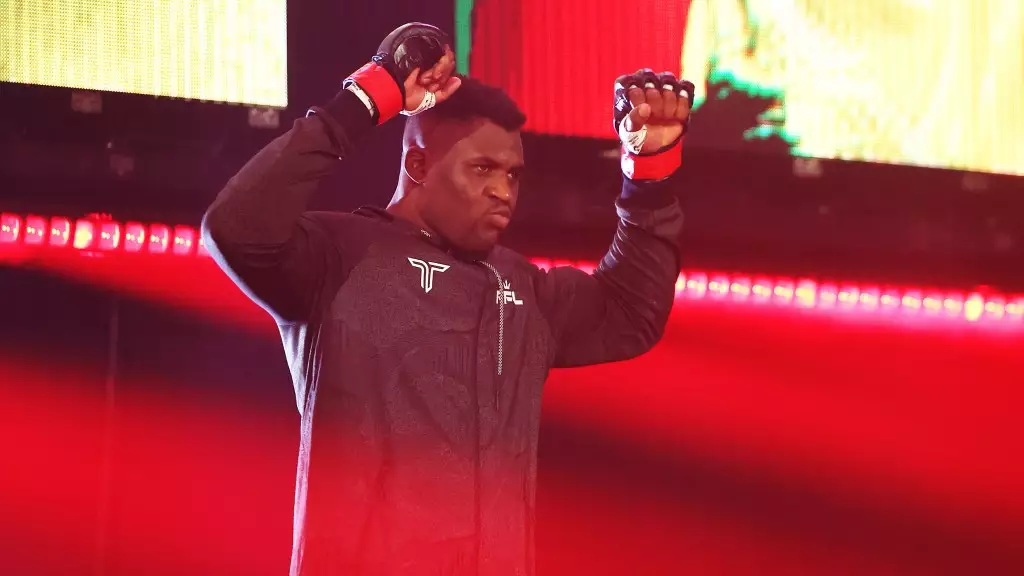The relationship between fighters and their promoters has always been complex, fraught with tension and wielded by the influences of career motivations, financial disputes, and public personas. Nowhere is this more evident than in the ongoing saga between former UFC heavyweight champion Francis Ngannou and UFC president Dana White. Following Ngannou’s impressive performance against Renan Ferreira in PFL: Battle of the Giants, White has taken the opportunity to reiterate his narrative about Ngannou’s departure from the UFC, igniting further discussion and controversy.
Francis Ngannou’s transition from the UFC to the Professional Fighters League (PFL) is not merely a change of scenery; it represents a significant strategic decision informed by Ngannou’s long-term career aspirations. After spending his last UFC fight defending his title against Ciryl Gane in January 2022, Ngannou left the organization due to a series of contract disputes. A critical issue was the UFC’s refusal to support Ngannou’s desire to explore boxing—a lucrative opportunity that other promotions were willing to accommodate. This aspect highlights a fundamental shift in Ngannou’s approach to managing his own career, emphasizing autonomy and financial gain over adherence to contractual constraints.
Ngannou’s recent victory in the PFL not only marked a triumphant return to the octagon but also reaffirmed his resilience as a fighter. Despite the criticisms levied against him, he aimed to prove his worth outside the UFC’s restrictive environment. Ngannou’s pursuit of greater financial rewards can be seen as a willingness to take risks, demonstrating a commitment to creating a legacy on his own terms.
In the aftermath of Ngannou’s fight, Dana White’s comments suggested a fixation on the past rather than acknowledging the contemporary realities of the sport. White’s assertion that Ngannou’s departure was motivated primarily by financial concerns casts a shadow over the complex dynamics at play. By claiming that Ngannou left the UFC due to fear of losing to Jon Jones, White has framed his narrative as one of vindication. This not only serves to protect the UFC’s image but also raises questions about the authenticity of White’s view of the situation.
White’s comments serve a dual purpose; they provide insights into his perspective but also help him maintain a degree of authority within the sport. During interviews, he often downplays Ngannou’s success, suggesting that the promotion offered more lucrative contracts. However, these assertions beg a deeper analysis of how fighter contracts are structured and what constitutes a fair deal for the athletes who put their lives and careers on the line.
In interviews following his fight, Ngannou’s reluctance to engage in a war of words with White embodies a more mature approach to the situation. Rather than retaliating with further accusations or defenses, he chooses to focus on personal growth and success. His assertion that he has earned “more money than he would have ever made in the UFC” is a powerful testament to his decision to pursue opportunities that he was barred from while with the promotion.
Ngannou emphasizes the need for White to confront his own emotions regarding their fractured relationship. By illustrating how he has thrived post-UFC, Ngannou challenges White’s narrative. He boldly states that the narrative woven by White is grounded in frustration and a sense of loss—the promoter has lost a star fighter, and quite possibly, the narrative control that comes with it.
The ongoing discord between Ngannou and White shines a light on a more significant issue within combat sports: the balance of power between fighters and promoters. Ngannou’s departure from the UFC highlights a growing sentiment among fighters to seek control over their careers. The opportunities presented by organizations like PFL to engage in different types of fights, including boxing, resonate with a new wave of fighters who are prioritizing their own ambitions over promotion loyalty.
As mixed martial arts continues to grow in popularity, structural reforms regarding fighter contracts, revenue sharing, and promoter control may become increasingly critical. For Ngannou, this departure is less about antagonism with White and more about paving the way for a broader engagement around athlete rights and opportunities. Fighters who dare to pursue their ambitions openly redefine the landscape, leaving behind traditional narratives of dependence and subjugation.
The ongoing tale of Francis Ngannou and Dana White serves as a microcosm of the evolving nature of professional combat sports. It reflects how personal integrity, financial independence, and career aspirations can clash with corporate narratives, ultimately illustrating the intrinsic tension that defines the relationship between athletes and promoters. As Ngannou continues to forge his path, his story may serve as a catalyst for change within the industry and set a precedent for future generations.

